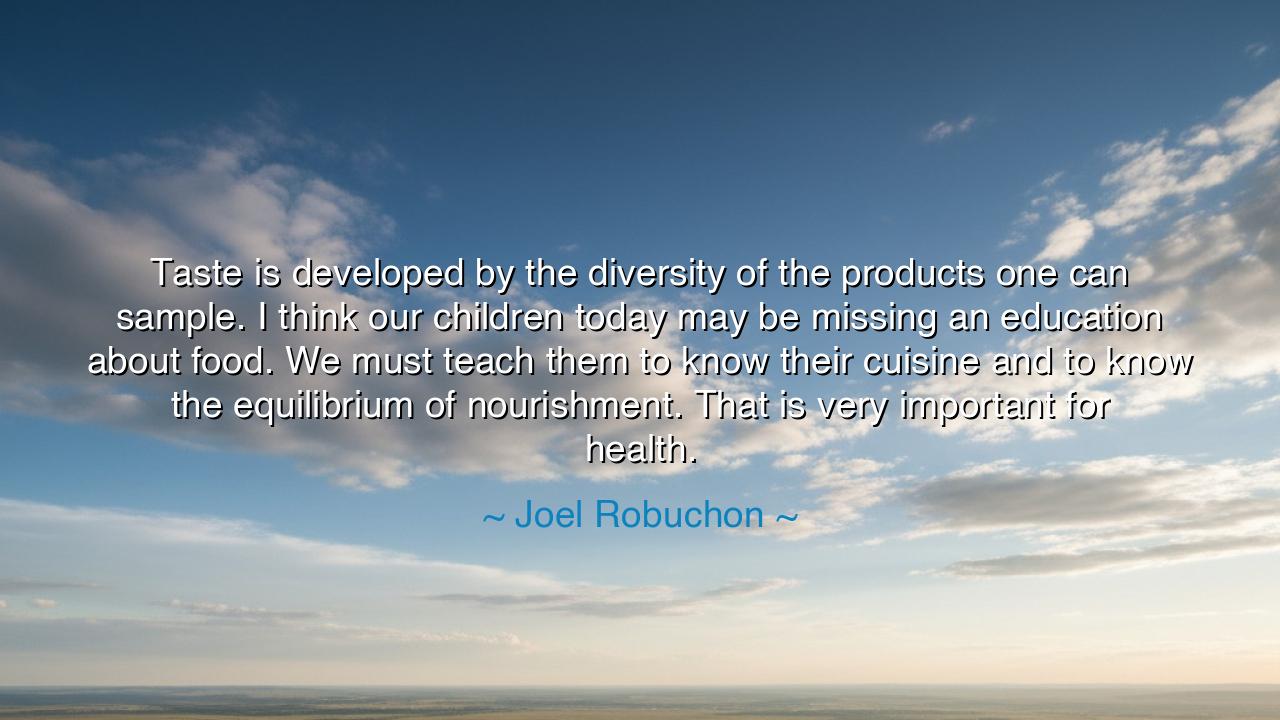
Taste is developed by the diversity of the products one can
Taste is developed by the diversity of the products one can sample. I think our children today may be missing an education about food. We must teach them to know their cuisine and to know the equilibrium of nourishment. That is very important for health.






The words of Joël Robuchon, master of the culinary arts, carry a wisdom that reaches far beyond the kitchen. When he says, “Taste is developed by the diversity of the products one can sample… We must teach our children to know their cuisine and to know the equilibrium of nourishment”, he is not speaking merely of food, but of the education of the senses, the shaping of the soul, and the preservation of human health. In these few lines, he exhorts us to guard against a life of dullness, where the tongue is numbed by sameness, and the spirit forgets the joy of discovery. He is warning that when children grow without diversity of taste, they grow also without the wisdom of balance.
From the earliest days of civilization, the ancients knew that food was not only fuel but a path to culture and identity. The Greeks spoke of moderation as the highest virtue, and their meals reflected harmony between bread, olives, wine, and fruit. In the East, the sages of China spoke of the five flavors—sweet, sour, bitter, salty, and umami—as a mirror of the cosmic balance itself. Robuchon’s call to recognize the equilibrium of nourishment is a continuation of this eternal truth: that what we put into our bodies molds not only our health, but also our capacity for wisdom, patience, and joy.
Consider the tale of the young Ming emperor Zhu Houzhao, who, in the 16th century, abandoned the traditional meals of balance taught by his ancestors. He surrounded himself with feasts of excess, ignoring the counsel of his elders. Though his palace overflowed with delicacies, his health declined, his mind grew restless, and his reign faltered. Contrast this with the Roman general Cincinnatus, who, though offered riches and power, returned to his farm, tending simple yet wholesome meals of grains, fruits, and vegetables. His strength of body and clarity of spirit made him a model of humility and service. These stories remind us that food is never neutral—it can uplift or corrupt, strengthen or weaken.
Robuchon feared that the children of our age, immersed in processed abundance yet deprived of true education in taste, are like emperors lost in feasts without meaning. To know one’s cuisine is not merely to know recipes but to understand heritage, memory, and the silent dialogue between earth and body. A child who has never tasted the bitterness of a fresh green, or the earthy sweetness of a roasted root, may never learn to appreciate the delicate balances that life itself demands. To deny them this education is to weaken their capacity for discernment, leaving them unprepared for the many choices life will demand.
Let us then not imagine food as trivial, but as the school of the senses. For in the act of tasting a ripe peach, the child learns of fleeting beauty; in the savor of bread, they learn patience and craft; in the bitterness of herbs, they learn that not all is sweetness, and yet all has its place. To teach children to cook, to recognize freshness, to balance a meal with grains, vegetables, and meat in harmony—this is to teach them not only health but philosophy.
And so the lesson comes clear: to preserve health is not only to extend life but to make life worth living. The great danger of our age is not famine but ignorance—an ignorance of what nourishes truly. Parents, teachers, and elders must awaken to this responsibility. We must guide the young toward tasting widely, not with gluttony, but with reverence; not with excess, but with balance.
Thus, let every household become a temple of nourishment. Invite children into the kitchen. Teach them the names of herbs, the colors of seasonal fruits, the rhythm of simmering pots. Let them taste bitterness and sweetness side by side, so they may grow strong not only in body but in judgment. Let them see that the table is a place of learning, just as the classroom or the temple is.
And the action is simple, though noble: introduce diversity of taste, honor your cuisine, balance your meals. In doing so, you pass on more than recipes—you pass on a wisdom that will endure through generations. For as Robuchon declares, to neglect this teaching is to imperil both body and soul. But to embrace it is to walk in harmony with nature, with culture, and with life itself.






AAdministratorAdministrator
Welcome, honored guests. Please leave a comment, we will respond soon